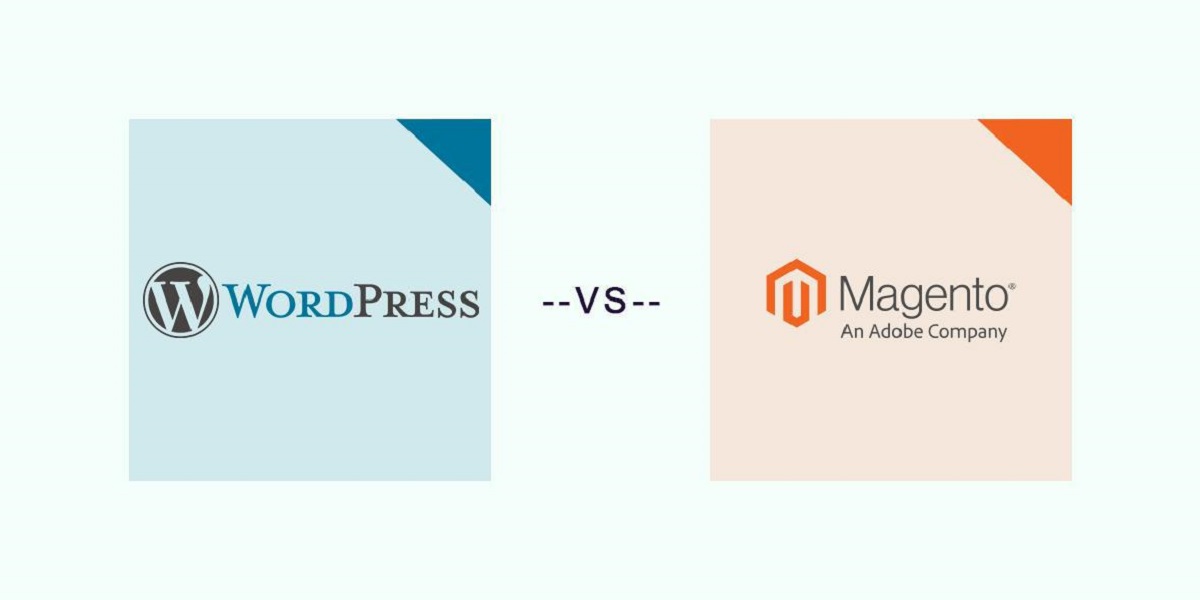
WordPress Vs Magento: Which One is Best For an eCommerce Website?
- By Archit
- 05-09-2022
- E-commerce
Currently accounting for about 14% of all retail sales worldwide, the rapidly expanding global market is facilitated by the increasing variety of eCommerce platforms and solutions, making it easier for eCommerce entrepreneurs of all stripes to establish a foothold.
Popular eCommerce platforms like WooCommerce and Magento function differently despite their similarities. In terms of your business, which option do you recommend?
Your technological proficiency and long-term plans for your eCommerce firm will largely decide this. This post will compare WooCommerce and Magento side by side so you can make an informed choice.
In this article, we'll compare Magento and WooCommerce's best features in terms of performance, security, pricing, user-friendliness, and tools for managing products on the back end. You'll be able to choose the best course of action after reading this.
WooCommerce
When you use WooCommerce, a free plugin that turns WordPress into a powerful and highly flexible eCommerce platform, you can create an online presence that is only limited by your own creativity.
This eCommerce plugin will make it much easier for you to run your business by tabulating all of the configuration options and product details in a format that is straightforward and easy to grasp. WooCommerce can handle the sales of both physical and digital products, as well as sales of both types of products simultaneously.
Magento
Magento is an ecommerce platform that is good for starting and running an online business because it has built-in tools that help. These features are vital for both. With this feature, you can compare products, group them into tiers, offer discounts and coupons, and manage multiple retail locations.
You can search through over 3,000 add-ons and apps that are available in Magento's Extensions market if you are looking for additional features such as the capability to track and segment clients within a CRM system.
A Comparative Analysis of Magento and WooCommerce
It is time to delve a little more into each platform now that they have been presented to you individually. In the next section, we'll compare Magento and WooCommerce by looking at the most important parts of each.
Ease of use
WordPress
What sets WordPress apart from the competition is its user-friendly interface. It's one of the easiest content management systems out there, and it comes with a tonne of free, customizable plugins for running an online store and attracting more customers.
The platform makes it easy for non-technical users to quickly add new content to a website, change what's already there, or take out whole pages. Generally speaking, WordPress is a straightforward and user-friendly system that makes it easy to build and personalise online shops.
Magento
Managing a core Magento site is much more difficult than managing a WordPress site. First-time shoppers might find it hard to find their way around the different product categories, product pages, checkout process, and other parts of the shopping experience.
If you want to make your development process easier, you should compare Magento to WordPress and hire a reputable Magento development company that can help you build a profitable web shop without you having to do any heavy lifting. This company will help you simplify your development process by comparing Magento to WordPress.
Product Management
WordPress
You can add a store to your WordPress site by using one of the plugins that are available for that platform.
WordPress's product management functions are best utilized when dealing with a limited number of goods and categories at a time.
Those who run an online store selling a large variety of products may find it difficult to manage their merchandise using WordPress.
Almost everything necessitates the addition of a plugin or add-on to be operational properly.
Magento
Magento is great for stores that sell many different items. Different types of products are easy to control.
With Magento, companies can easily add as many or as few products as they want to their online catalogs. The product categories you create can have as many variations and as many layers as you like.
Product management has many subfields, such as those that deal with configurable, packaged, and virtual goods.
Unlike WordPress, these features are not add-ons but rather part of the core installation.
SEO
WordPress
Like Magento, WordPress allows you to customize the look of your store by offering a variety of responsive themes and editing such things as alt-text for images, meta descriptions, and headlines.
Among the things that make WordPress stand out are the numerous SEO plugins available for purchase or installation along with the actual software. So, advanced users can get rid of code that slows down their sites or keeps search engine spiders from indexing them.
Non-technical users can use plugins for WordPress like Yoast SEO, WP Rocket, and Redirection to automate and simplify parts of the optimization process.
WordPress users with various SEO expertise can improve their shops because the platform provides additional options and tools for creating an SEO-friendly website.
Magento
There are a number of best practices that you can use to help search engines find your Magento store. Choose a theme that adapts to the size of the user's screen; optimize the alt text for your product images; create an XML sitemap; get rid of any duplicates; and change the settings to "nofollow" on your shopping cart, user profile, and administration pages.
Magento is great for users that are well-versed in SEO best practices because the majority of these tasks are performed manually.
Themes and templates
WordPress
WordPress comes packaged with an astonishing variety of themes. Website owners who want to use WordPress to build their sites can choose from more than 4,700 different designs in a theme library. In addition, each of these themes is appealing, smart, and adaptable to mobile devices.
Magento
Luma and Blank are the names of Magento's two pre-designed themes that come with the platform by default. Aside from these two themes, the Magento marketplace has a huge number of other attractive template sets that users can choose from. On ThemeForest, you may find other premium Magento themes to use in your store.
Security
WordPress
When eCommerce site owners compare Magento and WordPress, security is one of their main concerns. This is because more people are making payments online and want a safe place to do so.
When it comes to security, WordPress has no redeeming qualities. Since it is one of the most popular CMS platforms, it is more likely to be hacked or have other security problems. In addition, an overabundance of eCommerce plugins could make your website more vulnerable.
Before deciding on a third-party plugin, you should conduct an extensive investigation, as it may contain unsafe code that compromises your website's security to a significant degree.
To keep hackers from getting into your website, you will also need to keep updating your plugins, themes, and other parts. This might be a major boon for those whose primary objective is to sell more things online.
Magento
The robust security and well-fortified capabilities of Magento have earned it a stellar reputation. You should not be concerned about unsafe code or any other type of security problem due to the restricted number of extensions that are currently available. Verify that the add-on you are installing was crafted by an experienced developer and that it can be relied upon before continuing.
Having a solid customer base for your online business is easier if you run a reliable online store. Therefore, if you want to safeguard your website from potential security issues, you should make sure that you only install the right extensions.
Flexibility
WordPress
When contrasting the two content management systems, WordPress comes out on top due to its flexibility. Free and premium plugins for WordPress make it easy to turn any site into a fully functional storefront.
If you want to provide your consumers with a more fulfilling buying experience, you can upgrade your store to add standard eCommerce capabilities like product catalog management, event listings, a one-page checkout procedure, a credit card processing gateway, a contact form, and a live chat box.
In addition to those specifically designed for e-commerce, WordPress has a number of useful plugins, such as those for SEO, caching, backup, and social media integration. Also, the safest ways to pay, like PayPal and Google Checkout, will be built right in to make sure you are safe.
Magento
Magento focuses primarily on eCommerce-related skills, but WordPress has a huge array of plugins for numerous reasons. Since it is a core eCommerce system, it is hard to sell anything other than more shopping cart features.
Even though you can't change the way the platform works, Magento's core features and out-of-the-box features will let you build an online store that stands out from the rest.
The Magento platform lets you add very useful extensions that can be used to improve your online store's performance, manage your product catalog, offer discounts, make a design that works well on mobile devices, and much more.
Plugin & Extension
WordPress
WordPress's massive repository of plugins, which includes more than 59,000 free and paid plugins, is largely responsible for its widespread adoption. There are plugins for WordPress that can meet almost any need in logistics, technology, or advertising.
Both WordPress and Magento are attractive because they can be changed to fit different needs. Even add-ons like browser plugins aren't an option. Regardless of your level of technical expertise, you can create a bespoke plugin for either system to meet your specific needs.
Magento
The extension marketplace provided by Magento features a plethora of free and commercial extensions that may be used for a variety of purposes, including site optimization, customer support, marketing, payment gateways, security, and content and modification management. The Magento marketplace now has more than 3000 extensions available for purchase.
Wrapping up
Both WordPress and Magento are popular content management systems. The fact that this blog is so popular is proof of that. They are distinguished by particular qualities and advantages.
As a direct consequence of this, picking a victor amongst the two of them is not an easy task. Because of this, the developers need to hire a company that is proficient in both WordPress and Magento, and they will listen to the details you need and suggest which CMS you should opt for.
Recent blog

Crafting Eye-Catching Instagram Reels In Just 9 Easy Steps
Social Media | 25-04-2024.png)
Boost Sales and Conversions with Shopify's New AI-Powered Semantic Search
E-commerce | 24-04-2024




